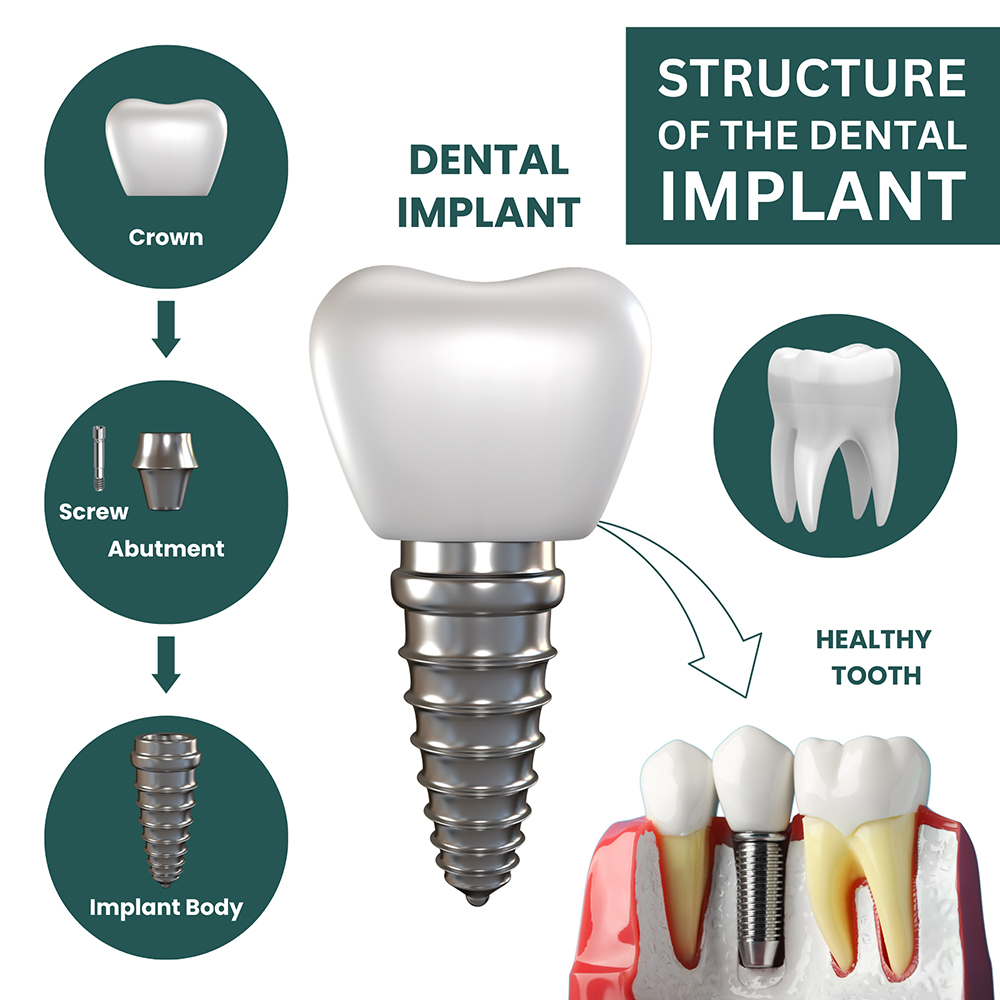Little Known Questions About Dental Sense.
Little Known Questions About Dental Sense.
Blog Article
6 Easy Facts About Dental Sense Shown
Table of ContentsA Biased View of Dental SenseGetting The Dental Sense To WorkThe smart Trick of Dental Sense That Nobody is Talking AboutExamine This Report on Dental Sense
are medical gadgets operatively implanted into the jaw to bring back a person's capability to chew or their appearance. They supply support for synthetic (fake) teeth, such as crowns, bridges, or dentures. When a tooth is shed as a result of injury or illness, a person can experience complications such as fast bone loss, defective speech, or changes to eating patterns that cause pain.Dental implant systems include an oral implant body and oral implant joint and might also consist of an abutment addiction screw. Wisdom tooth cavity. The oral implant body is surgically inserted in the jawbone instead of the tooth's origin. The dental implant abutment is generally affixed to the implant body by the joint fixation screw and expands with gums into the mouth to sustain the connected artificial teeth
(https://share.evernote.com/note/12f780ae-8ad1-693d-87b6-b9c57ca5907c)Structure of The Dental Implant System choosing oral implants, talk with your oral supplier about the potential advantages and threats, and whether you are a candidate for the procedure. Points to think about: Your overall health is a vital variable in establishing whether you are an excellent prospect for dental implants, how much time it will certainly take to recover, and how much time the dental implant may remain in area.
Smoking cigarettes may influence the recovery process and decrease the long-term success of the dental implant. The recovery procedure for the implant body might take a number of months or longer, throughout which time you typically have a short-term abutment in area of the tooth. the oral implant treatment: Meticulously adhere to the oral hygiene instructions provided to you by your oral company.
Not known Details About Dental Sense
Implant failing can result in the requirement for an additional surgery to repair or change the implant system. Recovers the capability to chew Recovers aesthetic look Helps keep the jawbone from reducing because of bone loss Protects the health of the bordering bone and gums Assists maintain adjacent (close-by) teeth steady Boosts high quality of life Damages to surrounding natural teeth throughout implant positioning Injury to the surrounding cells during surgery, such as sinus perforation Injury during surgery (for instance, fracture of surrounding jawbone) Insufficient function, such as feeling like the teeth do not attack together normally A feeling that the tooth is loose or turning in position resulting from a joint screw loosening up Implant body failure (looseness of the dental implant body) due to systemic infection, which may be most likely in patients with unchecked diabetes due to local infection in bone and gum tissues sustaining the implant body as a result of postponed recovery, which may be more probable in people who smoke Problem cleansing the gum tissues around the dental implant, resulting in bad oral health Untreated periodontal condition Post-surgical tingling as a result of nerve impingement or damage Constantly inform healthcare service providers and imaging specialists that you have dental implants prior to any kind of magnetic vibration imaging (MRI) or x-ray procedures.
FDA is not familiar with any unfavorable events reported for MRI or x-ray treatments with dental implants. Oral implants systems are commonly made of materials that follow worldwide agreement requirements of the International Company for Standardization (ISO) or ASTM International. These standards have details of what makes a secure material.

An oral implant is a structure that replaces a missing tooth. With screw-like tools, the specialist inserts an implant into the jawbone, and it acts as a support for a man-made tooth, called a crown.
The Only Guide for Dental Sense
Some people are not eligible for oral implant surgery. It is for dental specialists to run on people with: severe illnessuncontrollable metabolic diseasebone or soft cells illness or infectionIf these concerns are settled, an individual can have the surgical treatment. In, oral specialists avoid from operating people with: If individuals with any of the above undergo oral implant surgical treatment, there is a greater danger of the implant stopping working.

Dental dental implant surgical procedure is a tailored procedure. Offer you time to recover. Attach the post and final crown, bridge or denture.
Next, your surgeon will carefully put the oral implant right into your jaw. If your implant is near the front of your mouth, your dentist will make a momentary tooth for you to wear until you recover.
Not known Facts About Dental Sense
Throughout the healing phase, your jawbone must fuse to the dental implant. This process can take anywhere from 3 to nine months.
As soon as your implant heals, your dentist can connect the joint (little port post) and your final remediation (crown, bridge or have a peek at this site denture). This typically takes concerning one hour to finish and might need a 2nd small surgical treatment. You shouldn't really feel any type of pain throughout your oral implant procedure because your provider will utilize medication to numb your gum tissues.
Report this page